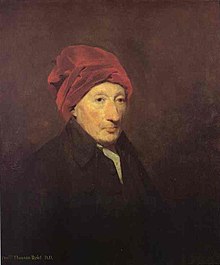Thomas Reid
Thomas Reid (born April 26, 1710 in Strachan , Kincardineshire , Scotland , † October 7, 1796 in Glasgow , Scotland) was a Scottish philosopher and contemporary of David Hume . He is considered to be the founder of the Scottish School of Common Sense Philosophy and played an important role in the (Scottish) Enlightenment .
Life
He spent the first part of his life in Aberdeen , where he studied at the University of Aberdeen and founded the Wise Club , a literary and philosophical association. In 1752 he got a chair at King's College Aberdeen. There he wrote An Inquiry Into the Human Mind on the Principles of Common Sense , which was published in 1764. Shortly thereafter, he followed a call to the University of Glasgow , where he succeeded Adam Smith . He retired in 1781. In 1783 he was elected a member of the Royal Society of Edinburgh .
philosophy
The enlightener Reid was of the opinion that a common sense (the " common sense ") is the foundation of any philosophical investigation or at least should be. He contradicted the contemporary idealistic, likewise enlightened empiricists David Hume and George Berkeley , who postulated that there is no provable outside world outside of human perception. According to Reid, the existence of matter and spirit is conveyed to us by the "common sense" which results from the way in which we were created by God.
In his day, Reid was considered more important than the much better known David Hume. He was a representative of direct realism (or common sense realism ) and rejected René Descartes ' rationalist approach and the empiricism of John Locke that was linked to it. Reid admired Hume and asked him to proofread his "Inquiry".
His theory of knowledge had a strong influence on the theory of morality . If philosophy succeeds in reinforcing our everyday convictions, we must act on them, since they are correct . His moral philosophy is shaped by the Stoa , Thomas Aquinas and Christian teaching . He liked to quote Cicero , from whom he also took the term sensus communis .
His reputation waned after (philosophical) attacks by Immanuel Kant and John Stuart Mill , but his teaching continued to spread, especially in North America , and was defended by the French cultural philosopher Victor Cousin .
William Hamilton , who began editing Reid's works, and William Alston continued to work with Reid in the 19th century . At the beginning of the 20th century, GE Moore , one of the pioneers of analytical philosophy , referred to Reid and brought his thoughts back to more attention. The two analytical philosophers Roderick M. Chisholm and Alvin Plantinga have also dealt intensively with Reid's works and adopted some of his views.
The anticipation of phenomenological thinking in Thomas Reid is presented by Lambert Wiesing in Philosophy of Perception .
Works
- Inquiry into the Human Mind on the Principles of Common Sense (Glasgow / London 1764), German Thomas Reid's study of the human mind, based on the principles of common sense . From d. Engl., After d. 3rd edition, translated, published by Schwickert, Leipzig 1782
- Essays on the Intellectual Powers of Man (1785)
- Essays on the Active Powers of Man (1788)
literature
- Steffen Ducheyne: Reid's Adaptation and Radicalization of Newton's Natural Philosophy . In: History of European Ideas , 32, 2006, pp. 173-189.
- Rosine Hage: Perceiving and Knowing. The role of nature in the thinking of Thomas Reid. Wehrhahn, Laatzen 2007, ISBN 3-86525-058-0
- Susanne Siebert: Reid, Thomas. In: Biographisch-Bibliographisches Kirchenlexikon (BBKL). Volume 7, Bautz, Herzberg 1994, ISBN 3-88309-048-4 , Sp. 1507-1511.
- Lambert Wiesing : Philosophy of Perception . Suhrkamp, Frankfurt am Main 2002, pp. 36-41.
- Reid, Thomas . In: Encyclopædia Britannica . 11th edition. tape 23 : Refectory - Sainte-Beuve . London 1911, p. 51 (English, full text [ Wikisource ]).
- Rebecca Copenhaver: Thomas Reid's Philosophy of Mind: Consciousness and Intentionality . (PDF) In: Philosophy Compass , 1/3 (2006), pp. 279–289
Web links
- Literature by and about Thomas Reid in the catalog of the German National Library
- Ryan Nichols: Thomas Reid. In: Edward N. Zalta (Ed.): Stanford Encyclopedia of Philosophy .
- Terence Cuneo: Reid's Ethics. In: Edward N. Zalta (Ed.): Stanford Encyclopedia of Philosophy .
- Reid resources provided by the University of Aberdeen's Research Institute for Irish and Scottish Studies
- Reid Studies - Journal on Thomas Reid (1998–2001), now included in the Journal of Scottish Philosophy (English)
- Some important works as PDF
Individual evidence
- ^ Fellows Directory. Biographical Index: Former RSE Fellows 1783–2002. (PDF file) Royal Society of Edinburgh, accessed April 2, 2020 .
| personal data | |
|---|---|
| SURNAME | Reid, Thomas |
| BRIEF DESCRIPTION | Scottish philosopher |
| DATE OF BIRTH | April 26, 1710 |
| PLACE OF BIRTH | Strachan (Scotland) , Kincardineshire , Scotland |
| DATE OF DEATH | October 7, 1796 |
| Place of death | Glasgow , Scotland |
